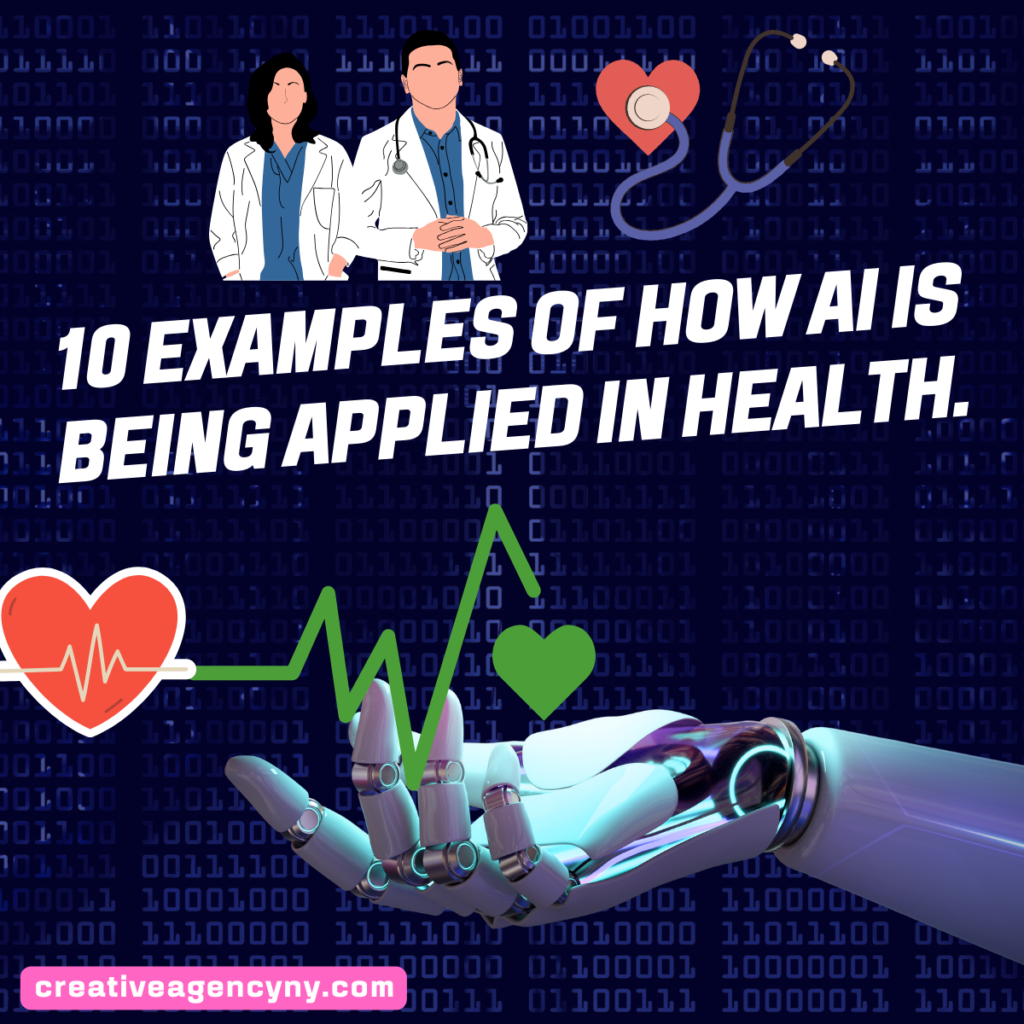
The world of technology is constantly evolving and its applications seem endless. Among its countless uses, one facet that has emerged recently is artificial intelligence in health. Artificial Intelligence (AI) has a great potential to revolutionize the field of medicine, and we are already seeing the first signs of this change. Here, we will show you 10 examples of how AI is being applied in health.
1)Disease Diagnosis
Early Detection of Cancer AI is helping doctors to detect cancer more effectively and earlier. With machine learning algorithms, the systems can analyze thousands of images of magnetic resonance and detect anomalies that could indicate the presence of tumors. According to a study by Philips1, AI-enabled camera technology can automatically detect anatomical landmarks in a patient to enable fast, accurate and consistent patient positioning. In addition, AI-enabled image reconstruction can help to reduce radiation dose and improve image quality, thereby supporting diagnostic confidence.
2) Drug Development AI-assisted Drug Design
AI can help to accelerate enormously the process of discovery and development of new drugs. The algorithms can analyze large databases of genetic information to identify possible targets for new drugs. For example, Docus.ai2, an AI-powered platform, seeks to improve medical diagnosis accuracy and boost health outcomes globally. It provides users with personalized health reports and diagnoses, validated by leading medical professionals from its extensive network. By swiftly and accurately responding to health inquiries, Docus.ai covers a wide range of symptoms, probable diseases, and potential treatment strategies.
3) Patient Monitoring
AI in Wearable Devices The wearable devices that use AI can monitor constantly the patients and collect useful data about their health status. These devices can alert the users or their doctors if they detect anomalies, such as an irregular heartbeat. This can help to prevent or treat chronic conditions, such as diabetes, cardiovascular diseases, or sleep disorders. Moreover, the data collected by the wearable devices can be used to personalize the care and the treatment of the patients, according to their needs and preferences.
4)AI-assisted Surgery Surgical
Robots In the surgical field, AI is being used to help doctors to perform complex surgeries. The surgical robots can perform precise and consistent movements, reducing the possibility of human errors. They can also provide real-time feedback and guidance to the surgeons, enhancing their skills and confidence. According to the NIHR3, AI could also help to personalize the surgical treatment, by selecting the best surgical approach and the optimal implant for each patient.
5) Virtual Assistants for Patients
Health Chatbots The health chatbots based on AI can answer questions from the patients, schedule appointments and send reminders of medications, which helps to improve the efficiency in the health centers. They can also provide health education and advice, such as how to manage chronic conditions, how to prevent infections, or how to cope with stress. The health chatbots can improve the access and the quality of the health care, especially for those who live in remote areas or have limited resources.
6)Health Records Management
AI in the Organization of Medical Records AI can help to organize and search in the electronic medical records of the patients, which can be a very complex and time-consuming task for the humans. AI can extract and summarize the relevant information from the medical records, such as the diagnosis, the treatment, the test results, or the allergies. This can help to improve the communication and the coordination among the health professionals, and to provide better and faster care to the patients.
7) Home Care Assisted by AI
AI in Home Care AI can be used to monitor the elderly or the people with disabilities in their homes, offering a higher degree of independence and security. AI can detect falls, emergencies, or changes in the behavior or the mood of the people, and alert the caregivers or the family members. AI can also provide social and emotional support, such as companionship, entertainment, or therapy. For instance, AI can create virtual pets or avatars that can interact with the people and stimulate their cognitive and emotional abilities.
8) Personalized Genomics
AI and DNA Personalized genomics, which involves the analysis and the interpretation of the individual genomes, is another area where AI is proving to be valuable. The AI algorithms can help to analyze the genomic data and to identify genetic variants that could be indicative of specific diseases. This can help to prevent or treat diseases that have a genetic component, such as cancer, Alzheimer’s, or cystic fibrosis. AI can also help to personalize the treatment, by selecting the best drug and the optimal dose for each patient, based on their genetic profile.
9) Personalized Therapies
AI in Personalized Treatments AI is helping to develop more personalized treatments for the patients. By analyzing large amounts of health data, the AI algorithms can identify patterns and associations that can be used to develop more precise and effective treatments. For example, AI can help to create immunotherapies for cancer, which use the patient’s own immune system to fight the tumor cells. AI can also help to create digital therapeutics, which use software or apps to deliver behavioral interventions, such as cognitive-behavioral therapy, mindfulness, or biofeedback.
10) Telemedicine
AI in Remote Care With the increase of telemedicine, especially during the COVID-19 pandemic, AI has proven to be a valuable tool. It can help to diagnose and treat the patients remotely, which is especially useful for those who live in remote areas or have mobility problems. AI can also help to improve the quality and the efficiency of the telemedicine services, by providing triage, screening, or follow-up. For example, AI can help to detect COVID-19 from chest X-rays or voice recordings, and to monitor the symptoms and the oxygen levels of the patients at home.
Frequently Asked Questions
Will AI replace doctors?
No, AI is here to help, not to replace. Doctors have skills and experience that cannot be replicated by machines. However, AI can relieve the workload of the doctors and increase their efficiency.
Is AI in health safe?
The safety of AI in health is a valid concern. The security and privacy measures must be in place to protect the data and the rights of the patients and the health professionals. Moreover, the AI systems must be transparent, explainable, and accountable, to ensure trust and reliability. AI in health should always be supervised and regulated by humans, and follow the ethical principles and the legal standards.
 Creative agency information Information about media, marketing y creative
Creative agency information Information about media, marketing y creative


